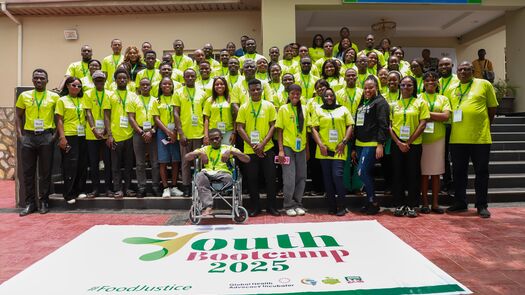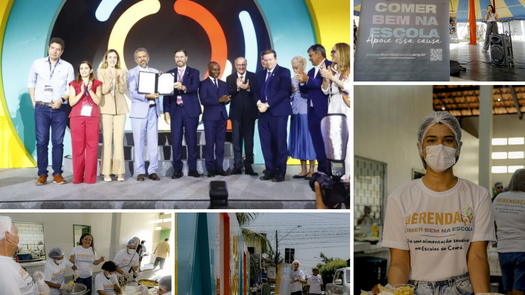November 25, 2025

Nearly 1.8 million children and adolescents in the state of Ceará will now be exposed to healthier school food environments thanks to a new law. On September 18, Governor Elmano de Freitas sanctioned Law 19.455/2025, which prohibits the provision, sale and advertising of ultra-processed products (UPPs) in public and private schools across the state. This makes Ceará the first state to pass a state-wide law following Brazil’s adoption of the 2023 federal decree on healthy school food environments.
Governor de Freitas made the announcement at the Global School Meals Coalition Summit in Fortaleza, alongside Brazil’s Vice President Geraldo Alckmin and Minister of Education Camilo Santana. Brazil’s National School Feeding Program (PNAE)—considered a global gold standard in protecting children’s right to healthy food—currently restricts, through a federal resolution, the amount that can be spent on UPPs in public school meals and requires schools to source food from local family farmers. The new law in Ceará strengthens and expands these national recommendations by establishing, through state legislation, a permanent ban on the sale, distribution and marketing of UPPs in both public and private schools. The timing of the victory, which coincided with the Global School Meals Coalition Summit, put Brazil in the global spotlight as a model for countries around the world working to protect children from diet-related diseases.
This milestone comes from determined advocacy led by Global Health Advocacy Incubator (GHAI) partner the Instituto de Defesa de Consumidores (IDEC). It also reflects years of coalition efforts that have expanded a wave of school food protection, including municipal policies in Rio de Janeiro and Niterói passed after advocacy efforts led by Instituto Desiderata. Based on this momentum, IDEC saw Ceará as an opportunity to advance protections at the state level because of its reputation for education reform.
IDEC’s team engaged directly with legislative leaders to build momentum, while also providing scientific evidence, legal expertise and model policies that demonstrated the feasibility of the measure. This technical foundation was critical in ensuring decision-makers understood the urgency and practicality of restricting UPPs in schools.
Equally important was IDEC’s ability to mobilize the public and civil society. Working in partnership with UNICEF and other allies, the organization connected the importance of children’s right to adequate nutrition with cultural traditions of healthy meals. The most visible demonstration came through the Merendaço, where children, parents and advocates gathered outside the Legislative Assembly to share nutritious food and send a message of public demand. The event attracted strong media coverage and generated pressure on legislators at a decisive moment. During a public hearing just days before the vote, students testified and more than one hundred civil society organizations from the state signed a letter of support, showing strong local resolve.
GHAI is proud to have supported IDEC in this achievement through technical collaboration and strategic assistance. Their persistence has delivered real protections for nearly two million children in Ceará, and their example will strengthen efforts to advance the right to adequate and healthy food for all children in Brazil and beyond.



